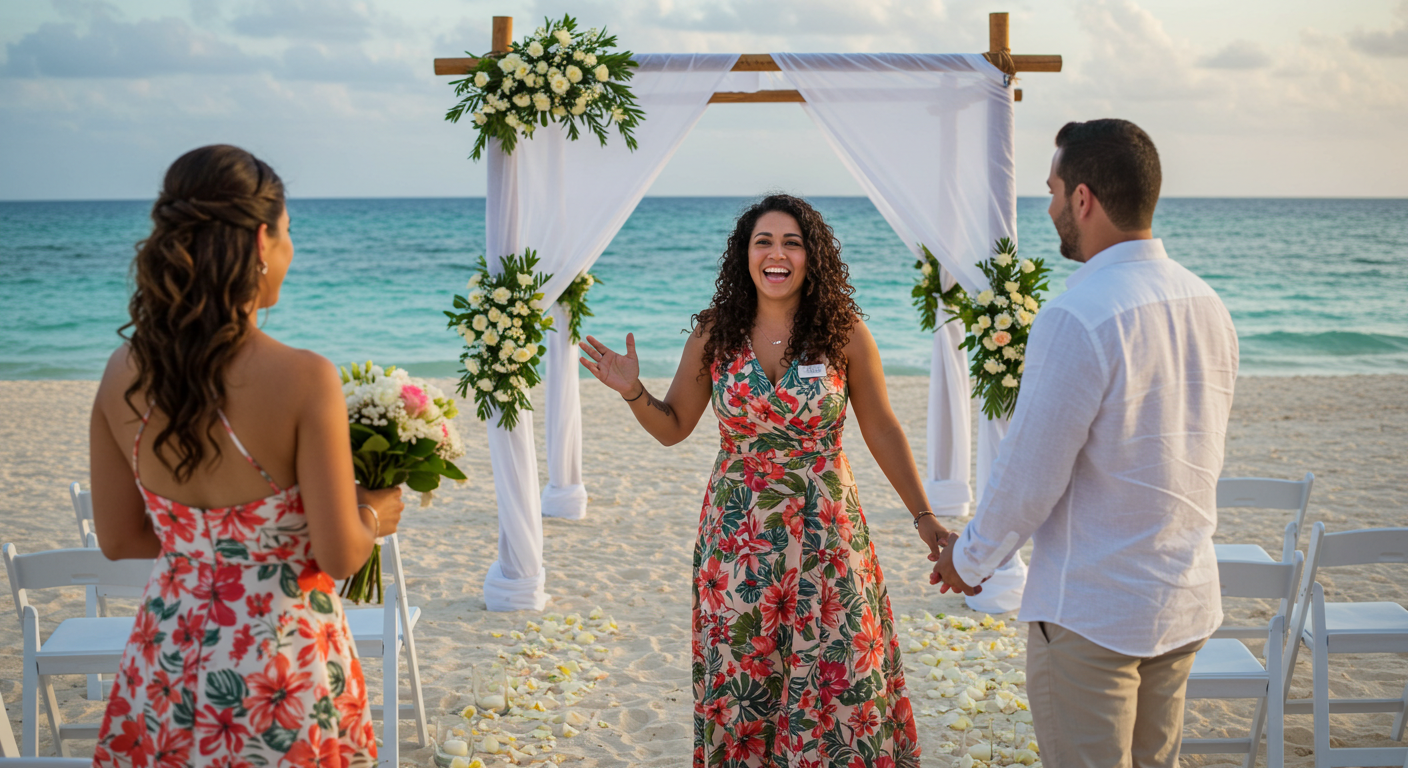Introduction: Embracing Your Out-of-Town Guests
Planning a wedding weekend can be an exciting yet overwhelming task, especially when accommodating out-of-town guests. These cherished individuals are not only there to celebrate your special day but have also made a significant commitment by traveling to be with you. As such, thoughtful planning is essential in ensuring their stay is comfortable, enjoyable, and memorable. Offering a warm welcome to these guests can greatly enhance their experience and reflect the love and joy of the occasion.
The process of involving out-of-town guests begins with hospitality. Extending your generosity throughout the wedding weekend allows friends and family to feel appreciated and valued. It is important to consider their unique needs, including transportation, lodging, and entertainment options. By providing a clear itinerary and information on local attractions, you can help them make the most of their visit and feel like an integral part of the celebration.
Embracing your out-of-town guests also sets a positive tone for the entire wedding weekend. When guests feel welcomed and cared for, they are more likely to engage in the festivities and create lasting memories. Simple gestures, such as arranging group outings, welcome bags, or personalized notes, can go a long way in cultivating a welcoming atmosphere.This not only enriches the experience of those who traveled but also strengthens the bond among your loved ones.
In summary, acknowledging the effort that out-of-town guests make to be a part of your wedding weekend is critical. With careful attention to detail and a commitment to hospitality, you can ensure that each guest feels included and cherished, setting the stage for an unforgettable celebration that resonates in the hearts of all who attend.
Creating a Detailed Itinerary
Planning a wedding weekend for out-of-town guests requires careful consideration, particularly when it comes to creating a detailed itinerary. A well-structured schedule ensures that guests can navigate the weekend’s events smoothly while enjoying every aspect of the celebration. The first step in crafting this itinerary involves outlining the key events: the wedding ceremony, reception, and any supplementary gatherings, including welcome parties or post-wedding brunches.
It is essential to include vital information such as the dates, times, and locations of each event. Providing a brief description of each gathering can help guests understand the significance of their attendance. For instance, a welcome party offers an opportunity for guests to mingle before the wedding day, fostering a more relaxed atmosphere. This could also be an ideal time to introduce the wedding party and share any special activities planned.
When organizing the schedule, it is crucial to account for adequate travel time between events. Consider the distances and potential traffic challenges that may affect guests’ arrival. The itinerary should also incorporate sufficient downtime for attendees to rest, refresh, and prepare for the celebration. By doing this, you help to alleviate any stress that might arise from a tightly packed schedule.
Furthermore, providing guests with an overview of local attractions and dining options can enhance their overall experience. Including recommendations for places to visit or restaurants to try during their free time can make their stay more memorable. Ultimately, a comprehensive itinerary serves as a valuable resource for your guests, ensuring they feel informed and comfortable throughout the wedding weekend.
Choosing the Right Accommodations
When planning a wedding weekend, selecting appropriate accommodations for out-of-town guests is crucial. The right lodging can enhance the overall experience and ensure that guests feel comfortable throughout their stay. Various options are available, each catering to different needs and preferences. Hotels often provide convenience and amenities such as breakfast, shuttle services, and concierge assistance. When choosing a hotel, consider factors such as proximity to the wedding venue, available budget ranges, and the number of rooms required. A convenient location can significantly improve guest satisfaction by minimizing travel time.
Rental homes are another option that can be appealing, especially for larger groups or families traveling together. These accommodations offer a home-like experience, often featuring multiple bedrooms, kitchens, and shared common spaces. Renting a home can be more economical for larger groups, allowing guests to share the cost while enjoying added privacy. However, it’s important to verify availability, consider the cleaning responsibilities, and be mindful of any house rules that may be in place.
Group blocks should also be considered when organizing accommodations. Many hotels offer special rates for wedding parties, allowing guests to book rooms as a collective unit. This not only assures that guests are close to one another but often provides a discounted rate as well. Communicating accommodation details effectively is essential; consider creating a wedding website or sending a detailed information packet. Include clear instructions on how to book rooms, specify any deadline for reservations, and highlight nearby attractions or conveniences that may enhance their stay. Addressing these aspects will ensure that your out-of-town guests have a memorable and enjoyable wedding weekend experience.
Transportation Logistics: Getting Around
Planning transportation logistics effectively is crucial when it comes to ensuring out-of-town guests have a seamless and enjoyable experience during the wedding weekend. A well-organized transportation plan minimizes stress and enhances guest comfort, which is essential for any successful celebration.
First and foremost, it is vital to coordinate airport transfers for guests arriving in the area. This could involve arranging shuttle services that can accommodate groups or individuals. It is advisable to communicate the shuttle schedule ahead of time, allowing guests to plan their arrivals accordingly. Consider hiring a reliable transportation company that can cater to various group sizes, ensuring that all guests can reach their accommodations without difficulty. Providing clear signage and a point of contact upon arrival at the airport can further ease this process.
Furthermore, arranging shuttle services to transport guests between different venues, such as hotels, the ceremony site, and the reception, is an important aspect of transportation logistics. Depending on the wedding size, either a single shuttle service or multiple buses may be necessary. Clear information on pick-up and drop-off times should be readily available in the wedding itinerary or welcome packets, which guests can use to navigate the schedule. This promotes convenience and ensures no one misses any important events during the wedding weekend.
Additionally, offering guidance on local transport options is vital for guests who may wish to explore the area on their own. Providing details about public transit, local taxis, or rideshare services can enhance their overall experience. Including maps or links to transport websites can be incredibly helpful. Clear communication regarding all transportation arrangements ensures that every guest feels supported throughout the weekend, allowing everyone to enjoy the festivities without the added stress of logistics.
Planning Activities and Experiences
When planning a wedding weekend, it’s crucial to create an engaging itinerary that caters to out-of-town guests, as many may be unfamiliar with the locale. Providing a selection of activities and experiences can significantly enhance their overall enjoyment and foster meaningful connections among family and friends. Start by considering local attractions that highlight the culture and uniqueness of the area. This could include historic sites, art galleries, scenic parks, or popular dining establishments that reflect the local cuisine.
Group excursions can also be a delightful way to engage guests. Organizing activities such as wine tastings, brewery tours, or city sightseeing trips can provide guests with memorable experiences while allowing them to explore the region together. Such excursions are not only entertaining but also create opportunities for social interaction among guests who may not know each other well. Collaborating with local businesses or tour companies can enhance these experiences, ensuring they are enjoyable and well-organized.
In addition to organized activities, consider more casual meet-ups. While the wedding itself is a central gathering, hosting informal events, such as a welcome dinner or a brunch the day after the wedding, can help guests mingle and relax. These gatherings allow guests to share laughter and stories and can bridge the gap between different circles of family and friends. Additionally, providing resources for guests to explore on their own, such as maps highlighting local favorites or a list of personalized recommendations, encourages them to create their own adventures throughout the weekend.
Overall, the goal should be to ensure that out-of-town guests feel included and appreciated. Thoughtful planning of activities and experiences not only enhances their stay but also enriches the entire wedding weekend. By incorporating engaging options and fostering connections among guests, hosts can create a memorable and joyous atmosphere that everyone will cherish.
Communication: Keeping Guests Informed
Effective communication plays a pivotal role in ensuring that out-of-town guests feel accommodated and engaged during a wedding weekend. The first step in this process is to establish a clear channel for sharing essential information, such as itineraries, venues, and emergency contacts. A well-structured method of communication will not only assist guests in navigating the events but will also foster a sense of connection and community among attendees.
One effective approach to maintaining clear communication is to create a dedicated wedding website. This platform can serve as a central hub for all relevant details, including timelines, venue maps, travel information, and accommodation options. By providing guests with access to this information in a timely manner, hosts can alleviate potential confusion and enhance the overall experience. Furthermore, a wedding website allows for continuous updates, ensuring guests receive the most current information as plans evolve.
In addition to a wedding website, utilizing group chats or messaging apps can further enhance communication. Creating a group chat for guests can facilitate real-time interaction, making it easier to share last-minute updates, answer questions, and encourage networking among attendees. This informal setting promotes dialogue and can help guests feel more comfortable and engaged with one another.
Moreover, sending out physical or digital invitations that include important details and instructions will ensure guests are well-informed before the celebration. Clear guidance on transportation options, parking, and any local attractions can be beneficial for out-of-town guests unfamiliar with the area.
In summary, prioritizing effective communication through a combination of a wedding website, group chats, and detailed invitations can significantly enhance the experience for out-of-town guests. Ensuring they are well-informed will contribute to a smoother wedding weekend and help create lasting memories for all involved.
Food and Beverage Considerations
Planning the food and beverage offerings for a wedding weekend is essential, especially when accommodating out-of-town guests. Consideration of dietary restrictions and preferences is paramount. Couples should provide a variety of meal options to ensure all guests feel included and valued. This might include vegetarian, vegan, gluten-free, and nut-free options, catering to the diverse needs of attendees.
A welcome reception is an excellent opportunity to greet arriving guests while serving light refreshments. This casual gathering can set a warm tone for the weekend and offers a chance to showcase local cuisine. Choose a catering service that specializes in the regional fare of the wedding location, which can help incorporate unique flavors and dishes that reflect local culture.
Moreover, inviting a local caterer may also provide insights into popular dining spots that guests can explore during their stay. It can be beneficial to compile a list of recommended local restaurants, highlighting various cuisine types and price ranges. This guide can be shared with guests through a wedding website or printed materials included in welcome bags.
Another thoughtful addition to the weekend itinerary is a post-wedding brunch, which serves as a relaxed farewell gathering for guests. This event not only allows couples to spend more time with attendees before parting ways, but it can also feature a buffet or family-style service that encourages mingling. Providing additional options for meals enhances the overall experience, highlighting the couple’s hospitality and care for their guests.
Ultimately, effective planning in the realm of food and beverage promotes an enjoyable experience for out-of-town guests, making them feel appreciated and welcome throughout the wedding weekend.
Setting a Budget for Your Weekend Plans
When planning a wedding weekend, establishing a budget is a fundamental step that directly impacts your guests’ experiences. Managing the financial aspects of accommodations, transportation, activities, and meals is essential to ensure a seamless event while also respecting personal finances. Couples need to begin by determining an overall budget for the weekend. This includes revisiting and re-evaluating available funds to cover various expenses without exceeding financial limits.
Accommodations typically account for one of the largest expenses. Couples should investigate various lodging options, ranging from hotels to vacation rentals, to provide their guests with a range of choices in price and comfort. Negotiating group rates with local hotels is often an effective strategy to minimize costs and provide a cohesive lodging experience. Additionally, leveraging online platforms can yield cost-effective options for guests seeking affordable accommodations.
Transportation is another critical component of the wedding weekend budget. Depending on the location, couples may need to arrange shuttle services or recommend nearby public transportation options to ensure guests can easily navigate between venues. Providing clear details about transportation logistics and costs can significantly enhance the experience for out-of-town guests.
Activities and meals are integral to creating a memorable weekend. To balance hospitality and financial considerations, couples should prioritize necessities while being mindful of overall expenditure. Creating a list of group activities—such as sightseeing, dining events, or casual gatherings—can help streamline choices and potentially reduce costs through group discounts. Furthermore, couples can explore local dining options that offer reasonable prices while still representing the locale’s culinary offerings.
In conclusion, setting a budget for your wedding weekend requires careful planning and consideration. By being proactive in managing expenses related to accommodations, transportation, activities, and meals, couples can balance their hospitality goals with their personal finances, leading to a delightful experience for all involved.
Final Touches: Personalizing the Experience
As couples plan their wedding weekend, incorporating personal touches can significantly enhance the experience for out-of-town guests. Personalization not only reflects the couple’s unique love story but also offers guests a more welcoming and memorable experience. One effective way to achieve this is through welcome bags, which can be filled with both practical and sentimental items that resonate with the couple’s journey. Consider including local snacks, personalized notes, maps highlighting nearby attractions, or a small memento that symbolizes the couple’s relationship. Such thoughtful gestures can set a warm tone right from the start.
Another way to make the weekend unforgettable is through personalized itineraries. A well-crafted itinerary provides guests with an overview of the weekend’s events, but adding a personal touch can elevate its significance. Couples can curate recommendations based on their favorite restaurants, entertainment options, or scenic spots in the area. Incorporating anecdotes or stories related to these places can create a deeper connection for guests, allowing them to engage more meaningfully with the couple’s history.
Additionally, thoughtful gestures during the wedding weekend can leave a lasting impression. For instance, couples might consider hosting a casual welcome reception, where out-of-town guests can mingle and get to know each other before the more formal events begin. This not only fosters camaraderie among guests but also reflects the couple’s effort in ensuring everyone feels included. Small, personal touches such as handwritten thank-you notes or a dedicated social media hashtag for guests to share their experiences can further enrich the overall atmosphere of the wedding celebration.
Ultimately, by thoughtfully integrating personal elements into the wedding weekend experience, couples can create cherished memories for themselves and their guests, transforming each moment into a reflection of their love story.







